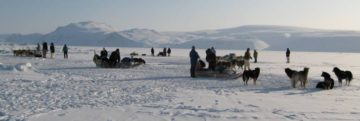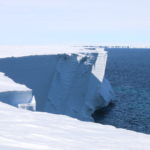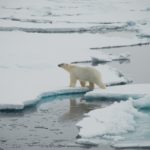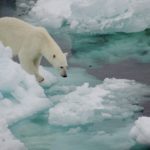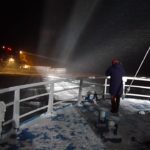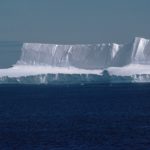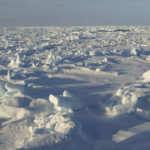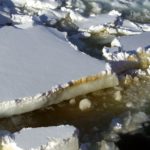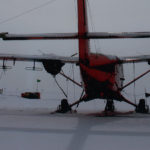This four-year EU FP7 programme of research brings together physicists, chemists, biologists, economists, and sociologists from 21 institutes in 11 countries across Europe. With a budget of €11.5M the team aims to understand and quantify the multiple stresses involved in the change in the Arctic marine environment. ICE-ARC is coordinated and managed by BAS.
Particular focus is on the rapid retreat and collapse of Arctic sea-ice cover. The most spectacular retreat is occurring in summer, and the complete loss of summer sea ice may occur in a very short period of time – years to decades.
There is also a significant reduction in sea ice extent in all seasons, which, if continued, will result seasonal ice cover and a widening annual window of the ice-free season.
The outcome of the project will be a better understanding of, and ability to predict, Arctic marine change. This will provide an improvement in the scientific baseline for guiding EU and international policies on the protection of the Arctic marine environment, at a time of increased socio-economic pressure, especially in the field of resource exploitation.
For more information, please see www.ice-arc.eu.
23 January, 2018
A team of leading Arctic scientists – including British Antarctic Survey glaciologist Dr Jeremy Wilkinson – are gathering in Davos this week at the World Economic Forum (WEF) meeting (23-24 …
8 November, 2017
This week (10-11 November) leading scientists and experts from EU-funded research programmes engage with political leaders from the Pacific Ocean and the Arctic to examine the economic and social consequences …
25 September, 2017
Arctic sea ice extent has likely reached its minimum extent for the year, at 4.64 million square kilometers (1.79 million square miles) on September 13, 2017, according to a team …
15 September, 2016
This year the extent of summer sea ice in the Arctic is heading towards being the second lowest on record. The Arctic sea ice minimum marks the day – typically …
1 December, 2015
BAS Organises Side Event for 2015 Paris Climate Conference (COP21) Journalists wishing to arrange interviews with keynote speakers from this session should contact Heather Martin. As world attention focuses on …
17 September, 2015
Arctic sea ice 2015 On September 11, the National Snow and Ice Data Centre (NSIDC) reported that Arctic sea ice reached its likely minimum extent for 2015. The minimum ice …
18 September, 2014
Arctic sea ice summer minimum 2014: A scientific perspective The Arctic sea ice minimum marks the day – typically in September – when sea ice reaches its smallest extent at …
13 February, 2014
British Antarctic Survey coordinates Arctic sea-ice investigation Arctic sea-ice cover is retreating at an unprecedented rate. Scientists fear we may see the complete loss of sea ice during the summer …
ICE-ARC data is stored in two locations:
- Observational platforms – real time data from buoys fed straight into BAS (WP1 – Observations).
- General ICE-ARC repository – this includes data from all other work packages. Please contact elaina.ford@bas.ac.uk for access or further information on the datasets held and we’ll put you in touch with the relevant people.
The Twin Otter is a high-wing, twin-engine, turbo-prop aircraft. They are used all over the world and are known for their rugged construction, reliability and short take-off and landing performance. …
Getting vehicles ready for Antarctic service
Airborne instrument capability

